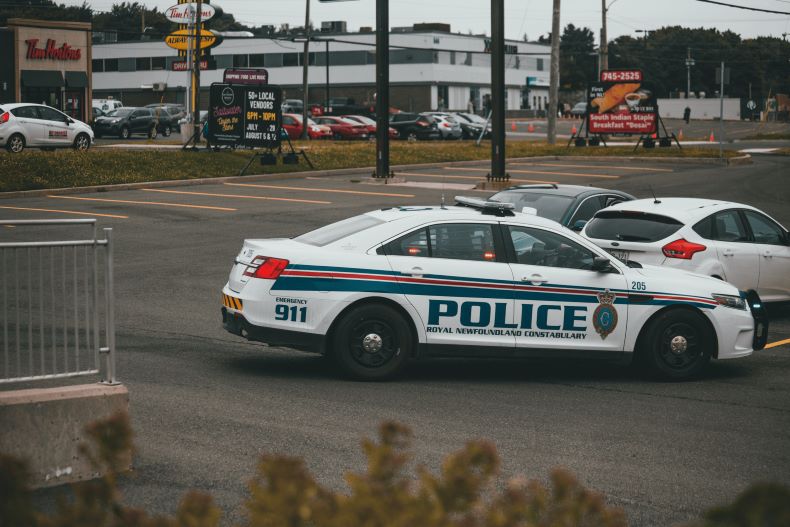
Getting into a car accident is a stressful experience, and it becomes even more complicated when a police officer is involved. While law enforcement officers are not immune to traffic accidents, there are unique considerations and potential implications when a civilian collides with a police vehicle. Understanding your rights and responsibilities in such situations is crucial for navigating the aftermath of the accident effectively.
This blog post will guide you through the complexities of police car accidents, including determining fault, insurance and compensation challenges, and the legal steps to take after the incident.
Key Takeaways
Determining fault in a police car accident involves understanding emergency response and exemptions.
Police officers can be held liable for negligence, but insurance and compensation challenges may arise due to sovereign immunity or qualified immunity.
Taking legal steps after an accident includes filing claims/lawsuits, wrongful death suits (if applicable), proving liability with evidence, and hiring an attorney.
Determining Fault in a Police Car Accident
Establishing liability in a police car accident can be intricate. This complexity arises from the necessity to evaluate negligence and consider exemptions for emergency response. The specialized traffic laws that govern police officers further complicate the process, possibly prolonging it beyond a typical accident’s time frame.
Factors such as the extent of injuries, negligence, exemptions for emergency response, and applicable laws for police officers are taken into account when determining fault in a police car accident involving emergency vehicles.
Emergency Response and Exemptions
Police officers, when responding to emergencies, have permission to circumvent certain traffic rules. Despite these exemptions, they are still obligated to drive with due care to prevent culpability for any ensuing police car collision. For a police officer to demonstrate that they were not obligated to adhere to a certain vehicle code, they must prove that the emergency response exemptions applied to their situation.
Lights and sirens on police cars are utilized to alert other drivers of an emergency vehicle’s approach and to allow for the safe pulling over of vehicles where possible.
Police Officer Negligence
Even when responding to an emergency, police officers may be held accountable for car accidents if they were careless, inattentive, or imprudent while driving. If the police officer’s actions are deemed to be negligent – such as:
Speeding
Distracted driving
Failing to signal
Other traffic violation
While not responding to an emergency, they may be held liable for the car crash.
To demonstrate reckless driving by a police officer, evidence such as:
Witness testimonies
Police reports
Medical records
Photographs
Can be employed to establish the negligence of the officer.
Insurance and Compensation Challenges
Securing compensation following a police car accident might prove difficult owing to the principles of sovereign immunity and qualified immunity that protect government agencies from liability. Furthermore, police vehicles and on-duty officers are not covered by typical car insurance policies but are instead insured by the government, making the claims process intricate and prolonged.
The compensation amount for a victim of a police car accident is determined by evaluating medical bills, lost wages, property damage, and pain and suffering.
Sovereign Immunity and Qualified Immunity
Sovereign immunity and qualified immunity may impede one’s ability to receive compensation from a police officer or government agency; however, the details are contingent upon the particular state. Qualified immunity is a legal doctrine that shields government agencies from potential litigation arising from the actions of their employees while in the course of their duties.
If it can be demonstrated that the officer was acting beyond the scope of their duties, they may be held liable for an accident despite sovereign immunity.
Pursuing Compensation Through Your Own Insurance
Considering the circumstances, utilizing your personal auto insurance may be the most appropriate option for repairs and damages, particularly in no-fault states or when dealing with governmental entities. In case a police car hits another car in a no-fault state, it is recommended to file a claim for any personal injuries and damages with one’s insurance provider.
Contact your insurance company promptly following the incident to facilitate dealings with government entities.
Legal Steps to Take After a Police Car Accident
Should you be involved in a car accident with a police officer, it becomes imperative to undertake the necessary legal steps to safeguard your rights and interests. First, contact the police and remain at the accident scene until a reporting officer arrives to collect the necessary information and compile the report.
Next, document the scene by taking photographs of the accident, including the vehicles involved, any visible damage, and the surrounding area. Finally, schedule an appointment with your doctor promptly following the accident, even if you do not believe your injuries to be severe. Delaying a visit to the doctor could make it challenging to prove later on that you sustained an injury.
Filing a Claim or Lawsuit Against a Police Officer
The repercussions of a police car accident can be ruinous, particularly for those injured or their families. In such situations, they could be entitled to initiate a personal injury claim or a wrongful death lawsuit against the party at fault. Filing a claim against a police officer or department for a car accident involves navigating complex laws and procedures, including gathering evidence and ensuring compliance with relevant requirements.
Wrongful Death Lawsuits
Wrongful death lawsuits can be filed against a city or public entity by surviving family members of a person killed in a car accident with a police car. A “wrongful” death in this context is defined as one caused by:
Negligence
False imprisonment
Battery
Intentional killing
A police officer involved in a police car crash is apprehended as a criminal suspect by the police department.
Potential damages that may be sought in a wrongful death lawsuit resulting from a police car accident include medical expenses, funeral costs, loss of financial support, and more.
Proving Liability and Presenting Evidence
Success in a police car accident case hinges on the effective presentation of evidence and substantiation of liability. This may involve gathering witness statements, dashcam footage, and other relevant information to demonstrate the officer’s negligence. Attorneys may employ various techniques to present evidence in police car accident cases, such as conducting surveys of local businesses and residences to identify potential eyewitnesses, collecting physical evidence like photographs and videos, obtaining personal testimonies, and using dashcam footage or body-worn camera recordings.
The Importance of Hiring a Car Accident Attorney
Engaging a car accident attorney is of paramount significance. A skilled attorney can help with:
Navigating the complicated process of filing a claim against a city or government agency
Ensuring a fair settlement and protecting your rights
Providing guidance and support during this challenging time
Making sure that all the necessary steps are taken and that the claims process runs smoothly.

Get Help From a Knowledgeable Car Accident Attorney at BLG
In conclusion, car accidents involving police officers present a unique set of challenges, including determining fault, navigating insurance and compensation hurdles, and taking the appropriate legal steps. Enlisting the help of a knowledgeable car accident attorney is crucial to ensure your rights are protected and to pursue the compensation you deserve. Stay informed and prepared, and remember that you have options when it comes to seeking justice in police car accidents.
If you’ve been involved in a car accident with a police officer, it’s crucial to understand your rights and protect your interests. Our experienced attorneys at BLG are here to provide the legal guidance and support you need. Don’t navigate this complex situation on your own.
Contact us today for a free consultation, and let us help you safeguard your rights and ensure the best possible outcome for your case.
Frequently Asked Questions
What happens if a cop hits your car?
If a cop hits your car, you could be eligible to receive compensation for medical bills, lost wages, property damage, and pain and suffering. Speak with a lawyer to understand your rights and the amount that you could receive from your claim.
What factors are considered when determining fault in a police car accident?
When determining fault in a police car accident, factors such as the extent of injuries, negligence, exemptions for emergency vehicle response, and applicable laws for police officers are all considered.
How can I prove the police officer’s negligence in a car accident case?
Gather witness statements, dashcam footage, and other relevant information to prove the officer’s negligence in the car accident case.
Can I file a wrongful death lawsuit if my loved one was killed in a police car accident?
Yes, you can file a wrongful death lawsuit if your loved one was killed in a police car accident as surviving family members have the right to take legal action against the city or public entity responsible.
What are the legal steps to take after a police car accident?
Take action right away and contact the police, document the scene, collect information from other drivers involved, and seek medical attention if necessary.





